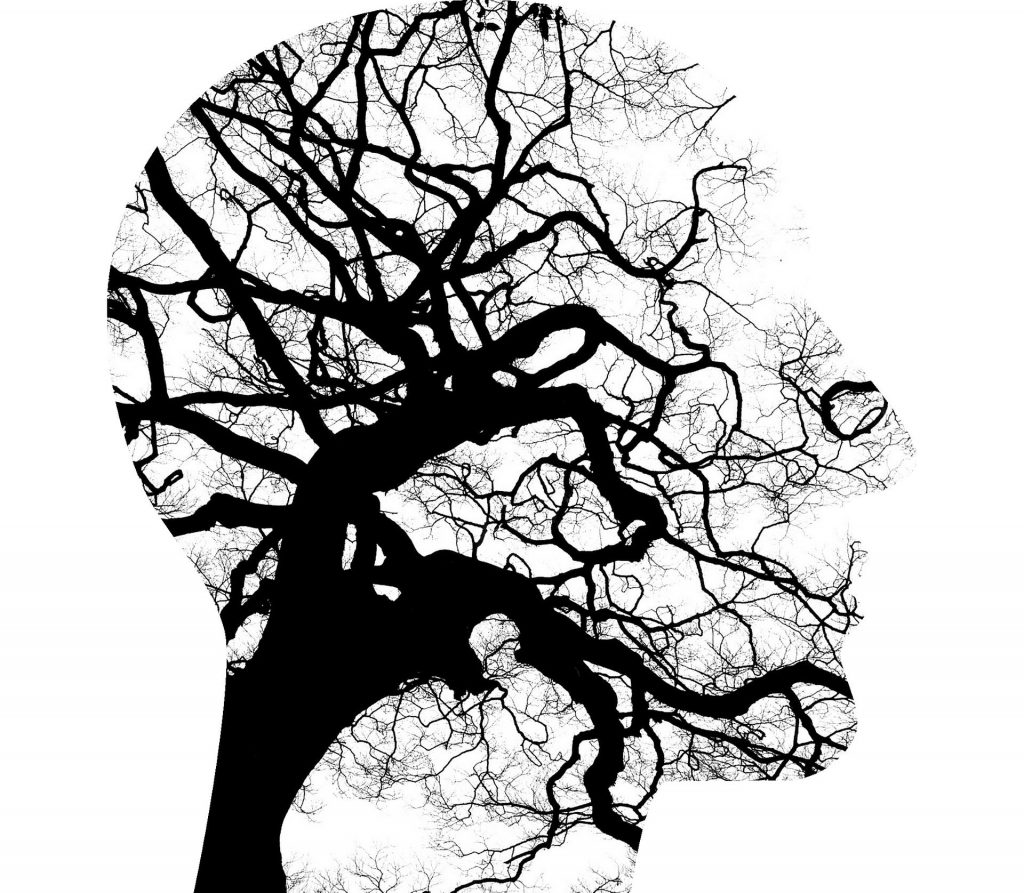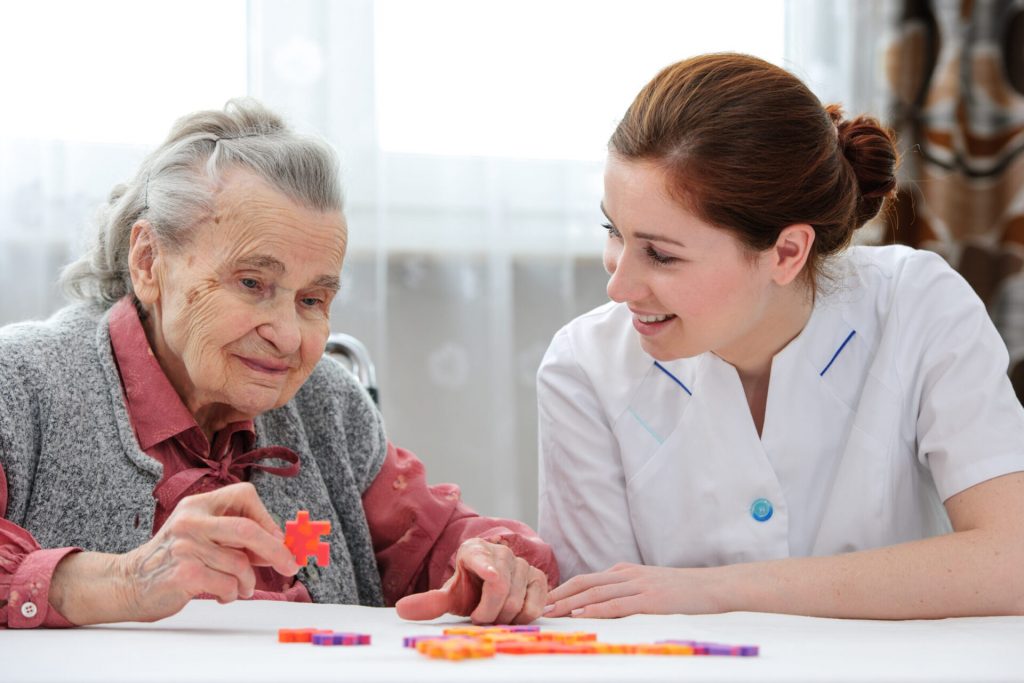Alzheimer’s can be a scary topic to discuss, especially if you think you or a loved one might be experiencing signs of memory loss or other symptoms related to the disease. It’s a progressive disease that may manifest itself with a few symptoms for years and gradually become more serious. There is currently no cure for Alzheimer’s and its effects are irreversible.

What is Alzheimer’s Disease?
Alzheimer’s Disease attacks brain cells, causing them to degenerate and die. This leads to memory loss and changes in a person’s behavioral and social skills. There is still a lot about the disease scientists don’t know, but they are continuing to study the changes in the brain, plaque buildup and how regular age-related changes can affect the makeup of cells in the brain.
What causes Alzheimer’s Disease?
Right now, there is not one clear-cut answer to this question. As scientists discover more about the disease, they’re finding links between natural human biology, family genetics and changes in proteins that carry out functions in the brain.
While researchers have not found one specific gene mutation that leads to a predisposition to Alzheimer’s disease, they have found three genes that could lead to an increased risk to early-onset Alzheimer’s. Those include mutations on chromosome 21 (found in people with Down Syndrome), chromosome 14 and chromosome 1. These mutations usually lead to a breakdown in a specific protein called APP, which is part of a process that creates harmful amyloid plaques, a key feature of Alzheimer’s Disease.
Scientists are also doing a great deal of research on whether certain lifestyle factors may contribute to the disease, such as heart disease, high blood pressure, stroke and diabetes.
What are the early symptoms of Alzheimer’s Disease?
Not all memory loss can be attributed to dementia or Alzheimer’s Disease. However, when memory loss disrupts daily functioning, it can be cause for concern. Here are some of the early signs of Alzheimer’s that might require a trip to the doctor for an evaluation:
- Forgetting dates, events, names
- Asking the same questions over and over without memory of doing so
- Challenges with problem-solving skills
- Difficulty keeping track of monthly bills
- Difficulty concentrating
- Trouble with completing everyday tasks such as driving to a familiar location or managing a grocery list
- Vision problems
- Difficulty following in conversation or repeating themselves during conversation
- Accidentally misplacing items and being unable to retrace steps to find them
- Decreased ability to make judgement calls
- Withdrawing from work, family or friends
- Abrupt changes in personality
If you or a loved one is displaying several of these symptoms, it might be a good idea to visit a doctor to see if there is a risk of developing Alzheimer’s. Early intervention can improve function, despite there being no way to reverse the disease.
What are the stages of Alzheimer’s Disease?
Alzheimer’s is a disease that typically brings about slowly progressing changes in the brain. When in the mild stage of Alzheimer’s, people begin to get lost, wander, have trouble paying bills and start to show signs of personality changes. This is the stage in which most people who have the disease will first be diagnosed.
When a person has moderate Alzheimer’s Disease, they may start to have difficulty recognizing familiar faces in friends and family. Their language skills will have decreased and may have an increased difficulty caring for themselves or performing simple tasks such as getting dressed or dealing with new situations. At this stage, hallucinations, confusion and paranoia can become a factor.
Severe Alzheimer’s Disease causes the brain to shrink, which leads to an inability to communicate with others. It also leads to body processes shutting down toward the end of life.
Being educated on the progression of the disease and how to effectively communicate with someone suffering from it will help you navigate through the stages with your loved one.
How is Alzheimer’s Disease Diagnosed?
If you recognize any of these signs, make an appointment with your doctor or your loved one’s doctor. Your primary care provider can help determine if the signs point to dementia or Alzheimer’s Disease.
To diagnose Alzheimer’s, doctors will ask several questions about the general well-being of the person in question including medication use, medical history, changes in behavior and ability to carry out regular daily activities. There will be tests for memory, problem solving skills, language and counting, as well as a blood and urine test to rule out any other underlying issue. Patient can also expect to undergo a brain scan to rule out any other cause of concern.
Remember, memory loss can also be related to other causes, like stroke, a tumor, Parkinson’s Disease, medication or non-Alzheimer’s dementia. If the diagnoses is Alzheimer’s, early intervention can help maintain or preserve function for awhile, even though the disease will eventually progress. Getting diagnosed early allows for families to prepare themselves for what’s to come and get affairs in order.
Newton Medical Center’s Generations Unit
Newton Medical Center is ready to help safely care for you or a loved one in its Generations Unit. This specialized unit was created to evaluate and treat adults with behavioral issues associated with aging. Families are welcome and supported through the whole process and given peace of mind that their loved one is safely and securely cared for.
With a private dining room, common area, individualized and group activities and certified animal-assisted therapy, our staff is trained to help adults (typically age 55+) who may be displaying signs of Alzheimer’s Disease or other dementias, self-aggressive behavior and mood changes, difficulties performing everyday activities or suffer from other psychotic disorders.
NMC also provides monthly support groups for those with loved ones suffering from Alzheimer’s and other dementias. Check our Facebook page or events page for details on when those classes will be offered.
June 2020’s class will be in-person at the NMC campus. Please enter through the emergency department and follow the signs to the Prairie Room, where the group will meet at 6:30 p.m. on June 25, 2020. If you do not have a mask, one will be provided for you.
Our providers are here to serve you, because your health is our focus.


